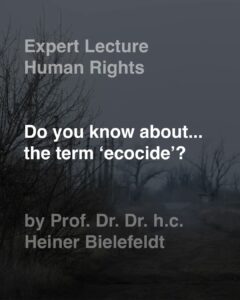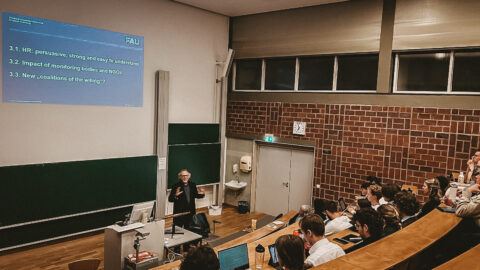Expert Lecture by Prof. Dr. Heiner Bielefeldt
Our Delegation had the privilege of engaging with Prof. Dr. Heiner Bielefeldt, a leading voice in the global fight for human rights. As the former UN Special Rapporteur on Freedom of Belief or Religion (2010–16), Prof. Dr. Bielefeldt drew on his vast experiences, including missions to UN Member States such as Cyprus, Kazakhstan, Viet Nam, and Lebanon, to provide a nuanced and invaluable perspective on the challenges and opportunities facing human rights today.
During the session, he emphasized the foundational nature of human rights, explaining that they are not mere tools or negotiable norms but intrinsic to the dignity of all individuals. Human rights, he argued, are preconditions for meaningful dialogue and must transcend geopolitical boundaries and cultural labels. While often dismissed as “Western constructs,” Prof. Dr. Bielefeldt underscored the universality of human rights and the need to de-westernize their narratives to make them accessible and applicable to all.
He also shed light on the critical role of monitoring bodies and civil societies in safeguarding human rights. Independent experts, not diplomats, work tirelessly to hold governments accountable, despite increasing resistance, political pressure, and the rise of state-sponsored “fake NGOs” (commonly referred to as GONGOs). These challenges, while daunting, underscore the importance of maintaining the integrity of these institutions and processes.
Despite these hurdles, Prof. Dr. Bielefeldt shared reasons for hope. He pointed to recent protests in China and Iran as powerful examples of how human rights continue to inspire people globally. Whether in the form of empty papers symbolizing freedom or the universal language of equality chanted by demonstrators, these movements highlight the enduring strength of human rights ideals—even under oppressive regimes.
 Moreover, Prof. Dr. Bielefeldt discussed the shifting dynamics of global coalitions. With countries from the Global South taking a leading role in supporting international justice mechanisms, such as the International Criminal Court (ICC), there is a growing sense that human rights advocacy is no longer solely a “Western” endeavor but a truly global movement.
Moreover, Prof. Dr. Bielefeldt discussed the shifting dynamics of global coalitions. With countries from the Global South taking a leading role in supporting international justice mechanisms, such as the International Criminal Court (ICC), there is a growing sense that human rights advocacy is no longer solely a “Western” endeavor but a truly global movement.
Prof. Dr. Bielefeldt also pointed to the ongoing ecological crisis in Ukraine — a devastating consequence of war — as the topic whose development he finds the most interesting. He noted its deep connection to the UN, reflecting on how environmental destruction transcends borders and time, necessitating robust international frameworks and collaboration to combat such ecocide.
As the discussion concluded, Prof. Dr. Bielefeldt reminded us that while human rights are rooted in our shared humanity, they are under constant siege and cannot be taken for granted. He left us inspired to continue the fight for justice, dignity, and equality, and to ensure that human rights remain a cornerstone of global politics.
This expert lecture was a profound reminder of the challenges and complexities in the world of human rights, but it also reaffirmed the importance of perseverance and collective action in the face of adversity.
📸 Credit: Image sourced from De Gruyter Blog – „Ecocide in Ukraine: How Russia’s War Will Poison the Country and Europe for Decades to Come“ (blog.degruyter.com)
